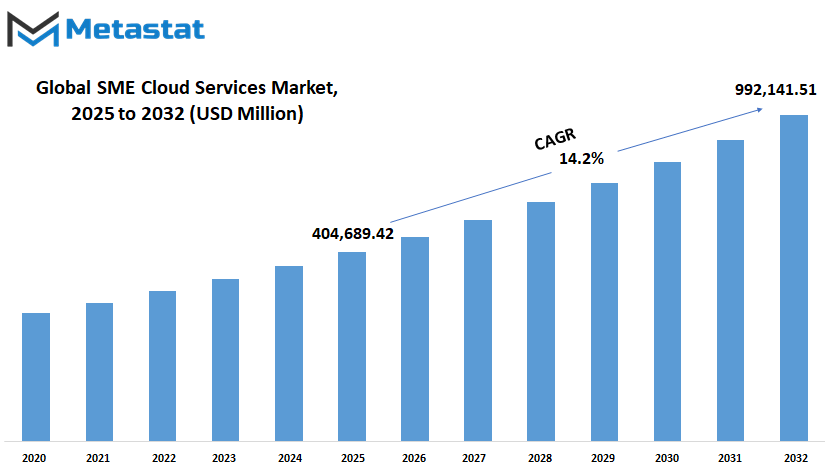MARKET OVERVIEW
The global SME cloud services market, placed in the larger information technology and digital transformation sector, will be focused around customized cloud-enabled solutions catering to small and medium-sized businesses. The market will cater to the distinct operating, infrastructural, and budgetary requirements of companies that are not on a large corporate level but are in need of secure, scalable, and dependable digital environments. Services provided in this arena will encompass storage, computing, application hosting, database management, and collaboration tools, all tailored to enable agile operations while keeping overhead costs low for SMEs from various industry verticals.
Instead of presenting general-purpose technology platforms, the global SME cloud services market will emphasize accessibility and ease of integration. Providers will create solutions which can be deployed without large IT departments or heavy in-house infrastructure. Service models will vary from Software as a Service to Infrastructure as a Service, enabling SMEs to select the degree of control and customization that fits their individual business model. As workflows in the digital realm become the norm for small-scale businesses, there will be an increasing need for easy-to-use, plug-and-play cloud tools, fueling a market founded on simplicity and not on complexity.
Geographically, the market will span both emerging and developed regions, albeit with different needs and consumption patterns. In developed economies, SMEs will demand sophisticated cloud solutions with built-in compliance capabilities and cybersecurity measures, while in developing markets, offerings will be focused on price points and bandwidth utilization. Geographical diversification will determine service provider development trajectories, mandating innovation addressing unique regulatory, infrastructural, and economic environments.
In terms of breadth, the global SME cloud services market will encompass a large number of industries ranging from retail and manufacturing to healthcare, logistics, and professional services. Every one of these sectors will need vertical-specific cloud capabilities, e.g., patient information management for healthcare SMEs or inventory management for retail-oriented companies. The capability of cloud vendors to offer sector-specific solutions will determine their value in this extremely segmented market. In addition, collaboration among cloud providers and local IT service companies will shape how well solutions are implemented, particularly in countries where internet penetration and technical support structures are still developing.
Another characteristic factor will be the price models optimized for SMEs, which generally have tighter budget constraints and shorter project durations. Subscription, pay-as-you-go, and freemium schemes will become common, enabling the smaller companies to dabble in the services before fully adopting them. Support and onboarding processes offered by vendors will also be major drivers of cloud integration in this market. Customization, multi-language user interfaces, and no-code or low-code functionality will further make the services accessible to users without technical expertise.
As the digital economy becomes increasingly integrated, the global SME cloud services market will evolve as a significant component of the overall tech space. It will not only portray technological advancements but also represent a transformation of how small and medium-sized enterprises do business, expand, and engage with customers and suppliers. The market will not merely provide tools it will build frameworks that enable smaller entities to operate with the responsiveness and capacity of much larger organizations, all via optimized cloud-based infrastructure.
Global SME cloud services market is estimated to reach $992,141.51 million by 2032; growing at a CAGR of 14.2% from 2025 to 2032.

GROWTH FACTORS
The global SME cloud services market will keep experiencing significant growth as a result of a number of future-oriented trends that are defining the way small and medium-sized enterprises function in the current era and how they will operate in the future. Among the most compelling drivers of this market is the increasing demand for these businesses for digital solutions that are cost-effective and flexible. Old IT configurations tend to involve expensive initial investment and continuous upkeep, which is not always within the reach of smaller companies. Cloud computing, however, makes more accessible the necessary tools at a lower cost without having to bear maintenance of physical equipment.
Yet another unmistakable indication of advancement is the growing movement toward remote work and online collaboration. More companies are opting to employ work-from-anywhere models, making cloud-based systems not only beneficial, but indispensable. Such tools facilitate communication, file sharing, and task management that is easy to use and can be expanded as the business expands. This change is not a fad, but a long-term shift in how business will be conducted going forward.
Nonetheless, there are some issues that may slow down this growth. One of the principal concerns is data security. Numerous small firms feel uncertain about transferring their data into cloud systems for fear of losing control over it or being targeted as a vantage point for cyber attacks. To this, maintaining various laws and regulations that differ from place to place presents another level of challenge, more so for companies that lack big IT divisions to support such work. These challenges can lead to decision-makers holding back even when the advantage is obvious.
To complicate the issue further is the absence of technical know-how in most small enterprises. Not every SME employs the personnel with the training and experience necessary to select and administer the most effective cloud services. This lack of preparedness can hinder their transition toward digital solutions. But in the future, there's genuine potential in the development of cloud platforms designed exclusively for the small business sector. These services are more specialized for various industries, are easier to employ, and more applicable to actual work tasks.
As more service providers start paying attention to the unique requirements of SMEs, the global SME cloud services market will be bound to create new avenues for innovation and expansion. The future is looking bright with platforms that not only are sophisticated but also easy to implement, enabling more enterprises to establish their niche in the digital arena
MARKET SEGMENTATION
By Type
The global SME cloud services market is slowly defining the future of small and medium-sized businesses' operations, data handling, and customer interaction. With continued digital transformation affecting organizations, cloud services are increasingly becoming an integral part of daily activities. The significance of this change is the ease of accessibility and flexibility that comes with these services. Small and medium-sized businesses, which tend to have fewer resources at their disposal than major companies, are now managing to function more efficiently at lower initial costs due to cloud technology.
In the future, the market will continue to expand consistently, particularly as more companies discover the benefit of moving to cloud systems. The global SME cloud services market by type is also divided into Public Cloud, Private Cloud, and Hybrid Cloud. Each variation is tailored to meet various business desires and requirements. Public Cloud is the cheapest alternative for businesses that require rapid access without the upkeep of physical servers. It will most likely appeal to companies that want to ramp up rapidly without making significant infrastructure investments.
Private Cloud, however, offers companies greater management of their information and its handling. Though it does demand a little more upkeep, it offers a feeling of possession and increased security. Private Cloud will be crucial for companies that handle confidential data or would rather have a dedicated environment for their processes. As data privacy and security become increasingly vital, the need for Private Cloud will increase.
There's also the Hybrid Cloud that brings together the best of both Public and Private Clouds. It enables enterprises to make choices on what data or processes remain private and what can be shared on a common platform. This balance provides flexibility and better resource utilization. In the future, most small and medium businesses will be likely to opt for this model since it accommodates expansion while providing space for control and custom usage.
What is unique about the global SME cloud services market is that it has the ability to put everyone on an even level. It will give smaller companies the ability to stand up to bigger companies by offering resources and platforms that were previously inaccessible. These services will continue to advance, making them easier to use and industry-specific. As companies integrate smarter business practices, cloud services will increasingly integrate into the business arsenal, becoming a normal business tool that provides more avenues for expansion and innovation.
By Application
The global SME cloud services market will rise consistently as small and medium enterprises look for smarter means of handling their businesses. More companies are shifting towards cloud-based services since they are flexible, cost-effective, and provide easy access to essential tools. With such solutions, businesses no longer have to spend big on physical infrastructure. They can instead concentrate on productivity, innovation, and tapping larger audiences. With the digital landscape growing, there will be more SMEs turning their focus towards cloud platforms that provide functional and scalable solutions.
The top reason for this expansion lies in the requirements for secure and stable data storage and backup. With increasing numbers of firms depending on digital tools, they will require reliable systems to protect their data. Cloud services simplify this with offsite storage that can be accessed remotely. More SMEs will in the future look to cloud providers that provide automatic backups and integrated security features. That is less downtime and fewer worries for business owners.
Business software like CRM and ERP are also major contributors to this transformation. They assist firms in structuring their operations and enhancing customer relationships. The use of cloud-based platforms of these systems enables firms to maintain their data in real-time. Not only does this enhance decision-making, but it also facilitates better performance by workers. In the future, cloud services providing these applications will be indispensable for SMEs who wish to remain competitive and well-structured.
Collaboration software will become even more essential. With more and more teams working remotely, it will be more and more crucial to have solid means to communicate and exchange documents. Video conferencing, document exchange, and email are now common necessities. In the future, these services will probably become more interconnected, so the employee will not lose productivity by switching between tools. Cloud-based collaboration platforms will keep helping team-based work in straightforward and utilitarian ways.
Analytics and artificial intelligence are also starting to become affordable for smaller businesses. With cloud services, companies can analyze customer behavior, identify trends, and make better informed decisions. This capability will drive SMEs to grow more intelligently and rapidly. Finally, development and test environments will continue to be an essential component of the cloud. These environments enable companies to experiment with new concepts without endangering their core operations. More businesses will utilize these services in the future to test and refine their products in a safe and flexible manner.
By End User
The global SME cloud services market will keep on expanding as small and medium-sized businesses turn towards online solutions to enhance their operations. With the world of business evolving, technology is no longer a luxury but a necessity, even for smaller businesses. Most of these organizations, no matter how few employees they have or how many hundreds, experience similar challenges. They require affordable tools to assist in managing information, maintaining smooth communication, and safeguarding their systems. Cloud services provide just that flexibility, reliability, and efficiency without the major expense of physical infrastructure.
Small companies, which are usually strapped for resources, benefit from cloud services as they can begin small and expand gradually. Rather than establishing complete IT departments, they subscribe to services that do everything from storing their data to running their accounting software. This leaves them with more time and energy to concentrate on what is really important delivering for their customers and building their business. Cloud platforms enable these businesses to be more connected no matter if they have one office or multiple offices. Updates occur automatically, so they don't need to be concerned about being up to date or keeping costly systems.
Medium businesses, although a bit bigger, have similar benefits in terms of cloud services. They might have slightly bigger budgets and more organized teams, but they still require intelligent and adaptive tools to keep up with big business. Cloud-based solutions provide them with cutting-edge features without the typical high prices. These range from improved data analysis, project management software, and improved security features. As more companies move online, such support facilitates them to react promptly to shifts in demand or client requirements.
In the future, the global SME cloud services market will continue growing as more medium and small-sized businesses embrace digital models. More artificial intelligence, automation, and remote access tools will be used, enabling companies to be more productive and responsive. Many firms will also seek service providers that provide not only storage but also specialist expertise, system maintenance, and robust support. The future is toward smarter, simpler ways for SMEs to handle their day-to-day work without compromising security and competitiveness. As the demand for agile, dependable, and cost-effective solutions continues to increase, cloud offerings will continue to be at the forefront of this digital revolution.
|
Forecast Period |
2025-2032 |
|
Market Size in 2025 |
$404,689.42 million |
|
Market Size by 2032 |
$992,141.51 Million |
|
Growth Rate from 2025 to 2032 |
14.2% |
|
Base Year |
2024 |
|
Regions Covered |
North America, Europe, Asia-Pacific, South America, Middle East & Africa |
REGIONAL ANALYSIS
As companies continue to embrace digital solutions to enable growth and agility, the global SME cloud services market will be increasingly essential. Small and medium-sized enterprises are finding more and more reasons to use cloud solutions to simplify their operations, lower infrastructure expenses, and enhance access to data and applications. The transition isn't solely for cost savings enabling businesses to stay agile and scalable in a competitive marketplace. Cloud services provide them with the ability to move in response to demand shifts quickly, reach new markets, and improve collaboration across distributed teams.
In the future, the global SME cloud services market will experience increasing interest in various regions. In North America, the U.S. is still at the forefront with its robust digital infrastructure and early adoption of cloud-based technologies. Canada and Mexico are also along this route, aided by government policies and increasing local awareness among businesses. In Europe, nations such as the UK, Germany, France, and Italy are increasingly investing in cloud platforms. These nations are fostering technology-savvy settings in which small enterprises are motivated to digitalize their operations, particularly as telecommuting becomes the new normal.
Asia-Pacific is the other top region with tremendous potential. India, China, Japan, and South Korea are already witnessing a transition towards cloud-based applications, led by the increase in startups and the demand for affordable IT solutions. They also have massive tech-savvy populations and growing internet penetration. With cloud services becoming more affordable, more small firms will be able to implement them, leading to a ripple effect on industries.
Brazil and Argentina have become key markets for cloud service providers in South America and, with growing investment in digital infrastructure and more entrepreneurs, the region will gain more prominence in the future. Another area that will witness an uptick in demand is Canada, which, along with Canada, represents the other strategic area for telecom operators. Small businesses are now finding the worth of cloud technology in aiding their expansion, especially where conventional infrastructure is scarce.
The prospects for the global SME cloud services market are bright, with regional development and increased demand for digital transformation on the rise. With developments in cloud technologies, they will be even more readily available, aiding small businesses to succeed in an increasingly interconnected and competitive world.

COMPETITIVE PLAYERS
The global SME cloud services market is going to keep expanding as small and medium-sized businesses increasingly take their operations online. Companies are now more and more recognizing the benefits of diverging from traditional infrastructure and moving towards a more agile, scalable digital landscape. It's not merely about convenience but also about having the ability to respond to changing customer expectations and remain competitive. Firms are beginning to realize that cloud offerings can deliver real-time access to data, enhanced collaboration, and security without hefty investments in physical hardware.
Market leaders are molding the industry's growth. Amazon Web Services (AWS), Microsoft Azure, and Google Cloud Platform remain the strongest contenders by providing wide-ranging services and robust support systems. These firms have developed platforms that fit the individual requirements of smaller companies, providing low-cost solutions that scale with the business. Oracle Cloud and IBM Cloud are also targeting the availability of cloud technology to enterprises that do not necessarily possess big IT teams. They are constructing tools that are easy to utilize while at the same time offering sophisticated features such as automation and data safeguarding.
At the same time, other prominent providers such as Alibaba Cloud, SAP Cloud, and Salesforce are introducing variety into offerings. Their services allow companies to automate operations, deal with customers, and process data without requiring extensive knowledge in tech. Organizations such as DigitalOcean, OVHcloud, Dell Inc., and Cisco Systems Inc are also taking a robust support role by offering more customized or specialized services that attract businesses with unique requirements. This competition is driving innovation and reducing costs, to the benefit of the whole market.
In the future, the global SME cloud services market will be influenced by increasing development in artificial intelligence, remote work technology, and data security. As more enterprises are working in hybrid environments, cloud services will have to provide even more seamless integration among varied tools and platforms. Firms will demand more intelligent solutions that will make decisions quicker, react to customer trends, and process volumes of data without breaking a sweat. With greater demand, cloud providers will need to make their services not only dependable but also easy enough for any business to implement and utilize effectively. With ongoing advances in speed, storage, and accessibility, the move to cloud-based operations will continue to intensify, providing even greater opportunities for small, medium, and large-sized businesses.
SME Cloud Services Market Key Segments:
By Type
- Public Cloud
- Private Cloud
- Hybrid Cloud
By Application
- Data Storage & Backup
- Business Applications (CRM, ERP)
- Collaboration Tools (Email, Document Sharing, Video Conferencing)
- Analytics & Artificial Intelligence
- Development & Testing Environments
By End User
- Small Businesses (1–49 employees)
- Medium Enterprises (50–250 employees)
Key Global SME Cloud Services Industry Players
- Amazon Web Services (AWS)
- Microsoft Azure
- Google Cloud Platform
- Oracle Cloud
- IBM Cloud
- Alibaba Cloud
- SAP Cloud
- Salesforce
- DigitalOcean
- OVHcloud
- Dell Inc.
- Cisco Systems, Inc.
WHAT REPORT PROVIDES
- Full in-depth analysis of the parent Industry
- Important changes in market and its dynamics
- Segmentation details of the market
- Former, on-going, and projected market analysis in terms of volume and value
- Assessment of niche industry developments
- Market share analysis
- Key strategies of major players
- Emerging segments and regional growth potential








 US: +1 3023308252
US: +1 3023308252






